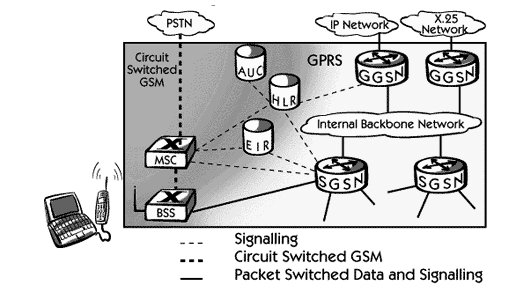GPRS

General Packet Radio Service (GPRS)
GPRS is a packet oriented mobile data service available to users of the 2G cellular communication systems global system for mobile communications (GSM), as well as in the 3G systems. In the 2G systems, GPRS provides data rates of 56-114 kbit/s.
GPRS is an expansion Global System for Mobile Communication. It is basically a packet-oriented mobile data standard on the 2G and 3G cellular communication network’s global system for mobile communication. GPRS was built up by European Telecommunications Standards Institute (ETSI) because of the prior CDPD, and I-mode packet switched cell advances.
GPRS overrides the wired associations, as this framework has streamlined access to the packet information’s network like the web. The packet radio standard is utilized by GPRS to transport client information packets in a structured route between GSM versatile stations and external packet information networks. These packets can be straightforwardly directed to the packet changed systems from the GPRS portable stations.
History Of GPRS:
GPRS was one of the main advances that empowered a cell system to interface with Internet Protocol systems, accomplishing across the board reception in the mid-2000s. The capacity to peruse the web from a telephone whenever through “dependably on” data networking, while underestimated in a great part of the world today, was as yet an oddity when it was introduced. Indeed, even now, GPRS keeps on being utilized in parts of the world where it has been too expensive even to consider upgrading cell organize framework to move up to newer alternatives.
According to a study on the history of GPRS development Bernhard Walke and his student, Peter Decker, are the inventors of GPRS – the first system providing universal mobile Internet access.
Goals Of GPRS:
Consistent IP services
Leverage industry investment in IP
Open Architecture
Service innovation independent of infrastructure
Services Offered:
SMS messaging and broadcasting
Push-to-talk over cellular
Instant messaging and presence
Multimedia messaging service
Point-to-Point and Point-to-Multipoint services
Protocols supported:
Internet Protocol (IP)
Point-To-Point Protocol (PPP)
Benefits Of GPRS:
Mobility:
The capacity to keep up consistent voice and information interchanges while moving.
Cost Efficient:
Communication via GPRS is cheaper than through the regular GSM network.
Immediacy:
Allows customers to obtain connectivity when needed, regardless of location and without a lengthy login session.
Localization:
Enables customers to acquire data applicable to their present area.
Easy Billing:
GPRS packet transmission offers an easier to use billing than that offered by circuit switched administrations.
GPRS is an innovation that numerous GPS beacons are using to get up to the minute data with tracking. When the GPS gadget records the information, it would then be able to be transmitted through GPRS to another central location, for example, a PC or through an email. It is the GPRS innovation that takes into consideration ongoing updates to GPS following frameworks. It is this direct GPRS association that gives the client of the GPS system the most reliable information available today.
